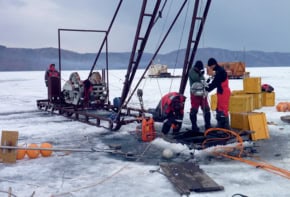
The ITER fusion experiment has had to bow to the impact of US sanctions against Russia and move the venue of its council meeting, scheduled for 18–19 June, from St Petersburg to the project headquarters in Cadarache, France. In a letter to council members on 30 April, ITER director-general Osamu Motojima had already warned of the impact of “international tension” on the $15bn project. He had said he was “very much concerned about the current international tension and its possible political impact on the ITER project”, adding that the project “should remain neutral, staying outside of the world political loops”.
Although council chair Robert Iotti says that council members have been working “quite harmoniously” to resolve a number of problems, including the venue for the council meeting, on 15 May a change of venue was announced. ITER spokesperson Michel Claessens says that because of the difficulty of US delegates travelling to Russia, all seven member delegations – China, the EU, India, Japan, Russia, Korea and the US – have agreed to the move. He adds that the Russian organizers were disappointed but agreed that they could not have the council meeting without the US taking part.
Money problems
Regardless of the venue, delegates face a daunting task on many fronts, not least that the US Congress is threatening to cut funding to ITER amid concerns over the project’s escalating cost. ITER has already had to make do with getting far less money from the US during the last few years than the $350m per year originally planned by the Department of Energy (DOE). The project has received only $200m this year and the administration has proposed just $150m for 2015. However, this cap pushes spending further into the future, which increases ITER’s total cost.
I’m really beginning to believe that our involvement in ITER is not practical, that we will not gain what we hope to gain from it, and instead this money could much better be spent elsewhere
US senator Dianne Feinstein
The DOE has declined for several years to give a figure for ITER’s estimated total cost, but in April Ned Sauthoff, head of the US ITER contingent, gave his latest projections to the DOE’s Fusion Energy Sciences Advisory Committee, which took the predicted price tag from $1.1bn to $3.9bn. Reaction in Congress was harsh. “I’m really beginning to believe that our involvement in ITER is not practical, that we will not gain what we hope to gain from it, and instead this money could much better be spent elsewhere,” senator Dianne Feinstein, energy and water subcommittee chair, said at a hearing on the same day. Press reports suggest that in its mark-up of the proposed budget, the Senate might suggest more savage cuts to ITER or even withdrawal, although any changes must be agreed by the House and the administration.
One of Congress’s demands of ITER is that the council must enact the 11 recommendations made in a recent scathing management assessment, which include moving ahead with replacing Motojima as director-general. Critics, including those in Congress, will be watching closely to see how the council acts.



